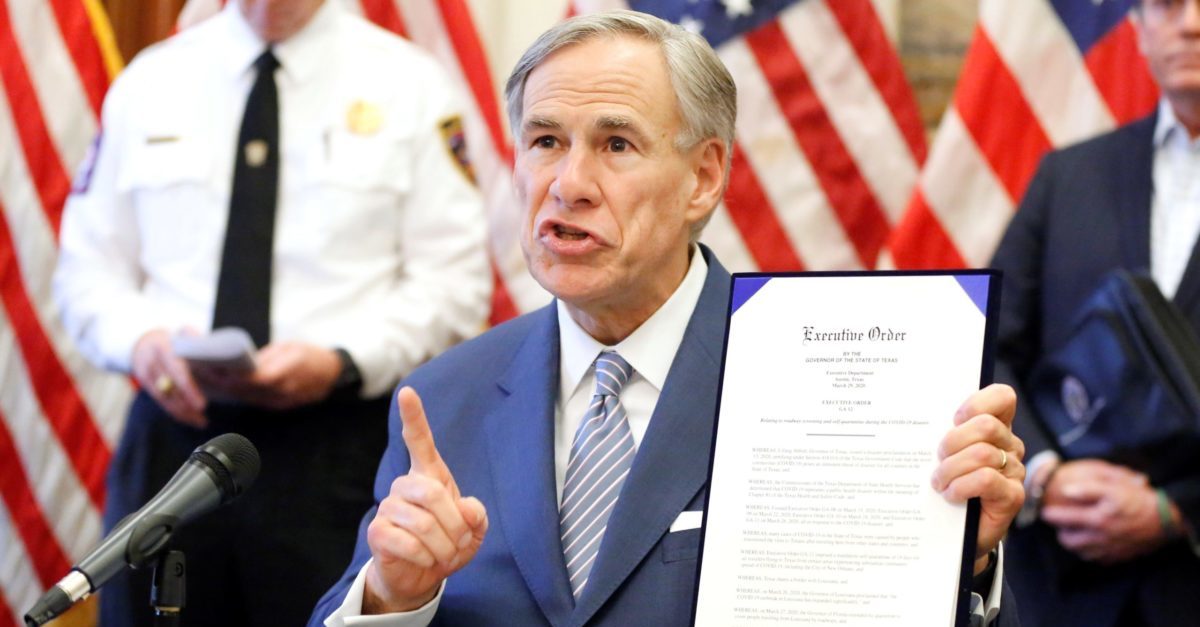
Texas Governor Greg Abbott (R), who has been under intense criticism for the better part of a day for severely restricting mail-in ballot drop-off locations, now faces a lawsuit filed by civil rights groups and Texas citizens in federal court.
The lawsuit, filed late Thursday, was an immediate response to Abbott’s proclamation, which suspended state election law to require that all in-person mail-in ballots can only be dropped off at one location per county in order to satisfy “enhanced ballot security protocol.” From the proclamation:
I further suspend Section 86.006(a-1) of the Texas Election Code, for any election ordered or authorized to occur on November 3, 2020, to the extent necessary to allow a voter to deliver a marked mail ballot in person to the early voting clerk’s office prior to and including on election day; provided, however, that beginning on October 2, 2020, this suspension applies only when:
(1)the voter delivers the marked mail ballot at a single early voting clerk’s office location that is publicly designated by the early voting clerk for the return of marked mail ballots under Section 86.006(a-1) and this suspension…
The lawsuit said that Abbott embarked on an “unconstitutional” mission to create new burdens and suppress the minority vote under the guise of security.
“In the midst of an election that is already underway, forcing such new burdens on voters who relied on a different set of election rules to make their voting plan, is unreasonable, unfair, and unconstitutional,” the complaint said. “And, as Governor Abbott recently argued, it engenders voter confusion and undermines the public’s confidence in the election itself.”
The complaint by plaintiffs League of United Latin American Citizens (LULAC), 82-year-old Texan Ralph Edelbach and 71-year-old Texan Barbara Mason began by using Abbott’s words against him.
“On June 29, 2020, Defendant Governor Greg Abbott argued in federal court that ‘precipitous changes to the [election] rules can cause ‘confusion’ and even undermine public confidence in the outcome of the election itself,'” the complaint said. “Three months later, with voting underway in Texas, Governor Abbott made exactly the type of ‘precipitous change’ that he had cautioned against.”
Those changes, which happen to affect Texas’s “largest counties, including Harris and Travis counties,” were an act of “arbitrary disenfranchisement” and a violation of the fundamental right to vote, the plaintiffs alleged.
“Governor Abbott’s order provides no justification for the sudden imposition of this harsh restriction except an ipse dixit statement that it is ‘appropriate to add ballot security protocols for when a voter returns a marked mail ballot to the early voting clerk’s office,'” the lawsuit went on. “But the Governor identified no security benefit to restricting the number of properly staffed ballot drop-off locations in a county and indeed there is none.”
The “eleventh-hour” reversal, the plaintiffs continued, “targets Texas’ most vulnerable voters—older voters, and voters with disabilities—and results in wild variations in access to absentee voting drop-off locations depending on the county a voter resides in.” The plaintiffs said that the decision creates conditions that make it “especially dangerous” for voters who are particularly vulnerable to COVID-19. In addition, the Abbott proclamation “results in predictable disproportionate impacts on minority communities that already hit hardest by the COVID-19 crisis,” they alleged.
The plaintiffs are seeking an injunction and a declaratory judgment from a federal court that the proclamation violates plaintiffs’ First and Fourteenth Amendment Rights, as well as the Voting Rights Act.
The complaint specifically alleged a violation of Section 2 of the Voting Rights Act, which the Supreme Court of the United States will be resolving questions about in the coming months.
“Texas’s arbitrary one-per-county limit on ballot drop-off locations violates Section 2 of the Voting Rights Act, 52 U.S.C. § 10301, because it results in the denial of the right to vote on account of race and language minority status, insofar as, under the totality of the circumstances, LULAC Plaintiffs and minority voters are denied an equal opportunity to participate effectively in the political process,” the complaint said. “Texas’s limits on absentee drop-off locations violate Section 2 because they deny and abridge the right to vote on account of race and language minority status.”
Colin Kalmbacher contributed to this report.
[Image via Tom Fox/Pool/Getty Images]